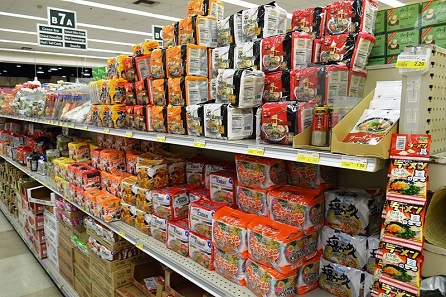by Annika Backe
November 17, 2016 – Hardly any TV footage on every-day life in a modern prison forgoes the introduction of the parallel currency with which the inmates try to raise their living standards. While products and services are usually paid with tobacco and cigarettes, more and more U.S. American prisoners prefer instant noodles instead.
Shelve full of instant ramen packs at a supermarket in Orange County, California. Photo: Nandaro / https://creativecommons.org/licenses/by-sa/4.0/deed.de
Chinese fast food
Having been invented by the Chinese, the instant noodles called ramen were distributed commercially by Japanese businessman Momofuku Ando since 1958. Made durable through frying and drying, it takes only a little bit of boiling water to turn ramen into a quick and cheap snack.
In Shin-Yokohama, Japan, an entire museum is devoted to ramen. Photo: Calton / https://creativecommons.org/licenses/by-sa/3.0/deed.de
Noodles as pre-monetary money in U.S. American prisons
Though this information does not seem overly spectacular at first, it has a serious background, according to a study of sociologist Michael Gibson-Light of the University of Arizona. He says that ramen was only able to gain currency as currency because the inmates were suffering from hunger. The administrations’ efforts to save expenses did result in less food, both in quantitative and qualitative terms, Gibson-Light explained. The daily rations of a prisoner must not cost more than $2.50.
Although some may believe that the study is not representative – in his study, Gibson-Light had asked around 60 prisoners, not much taking the total number of almost 2.3 million prison inmates into account – it nevertheless sheds some light on the alarmingly bad conditions in U.S. American prisons.
What it also stresses is the fact that parallel currency and emergency money was and still is mainly born out of crises. The producers of noodles, on the other hand, are probably happy: although resulting from desperation, the boom of the ramen block as underground currency is most likely to generate sustained profit.
More information on the mentioned study is available on the website of the American Sociological Association.
To learn more about Momofuku Ando, please click here.
The former prisoner Gustavo “Goose” Alvarez published a cookbook full of ramen recipes.
And the negative effect of too much ramen is at the heart of an article in The Guardian.






